【中考夺分译林牛津版】2015英语中考夺分课件 语法精点击-专题12简单句
文档属性
| 名称 | 【中考夺分译林牛津版】2015英语中考夺分课件 语法精点击-专题12简单句 | 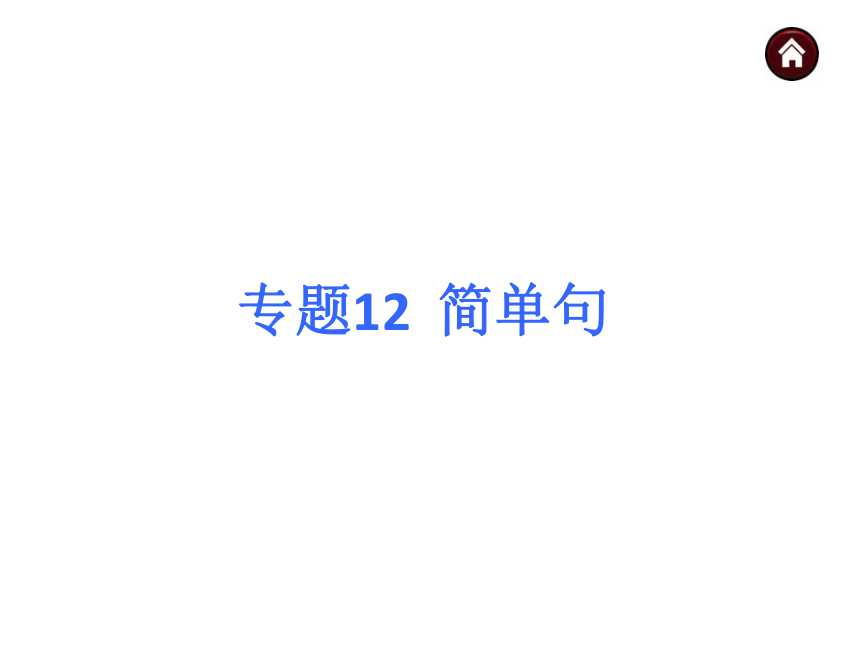 | |
| 格式 | zip | ||
| 文件大小 | 71.9KB | ||
| 资源类型 | 教案 | ||
| 版本资源 | 牛津译林版 | ||
| 科目 | 英语 | ||
| 更新时间 | 2015-04-13 13:27:56 | ||
图片预览

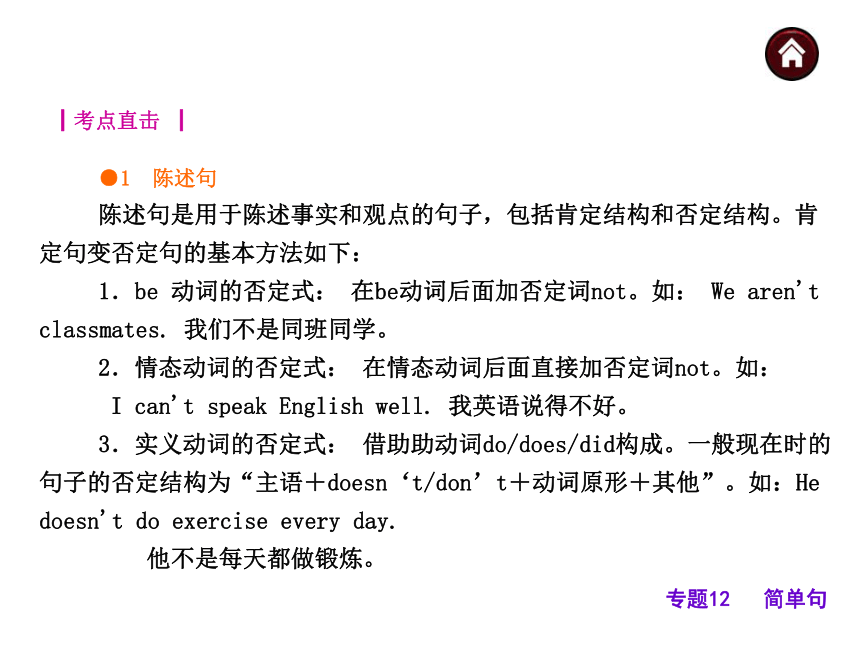
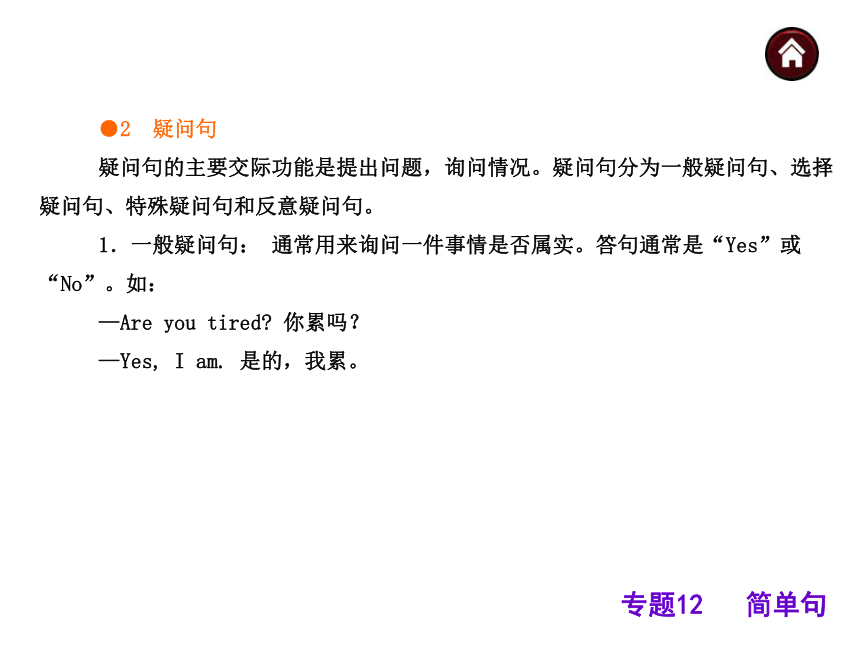
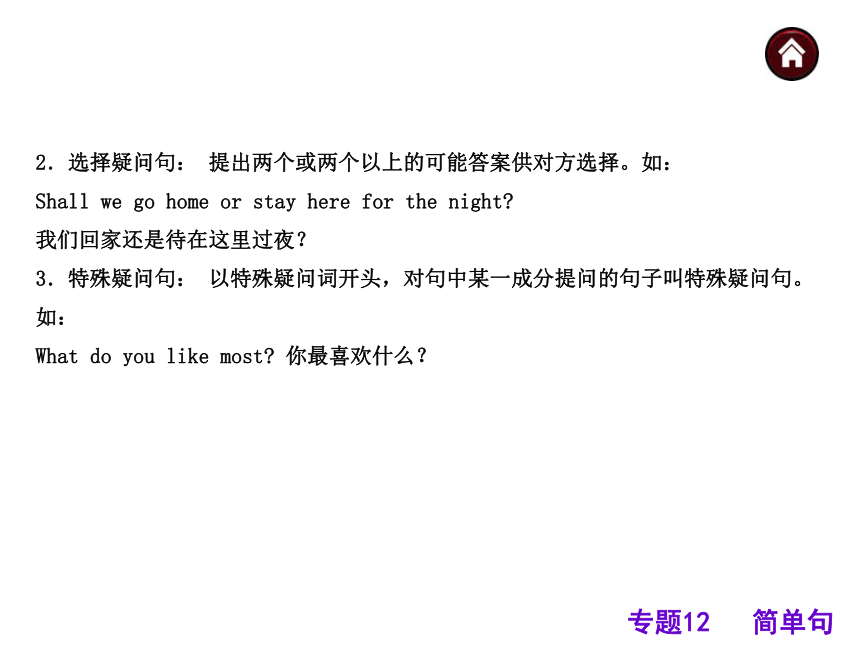

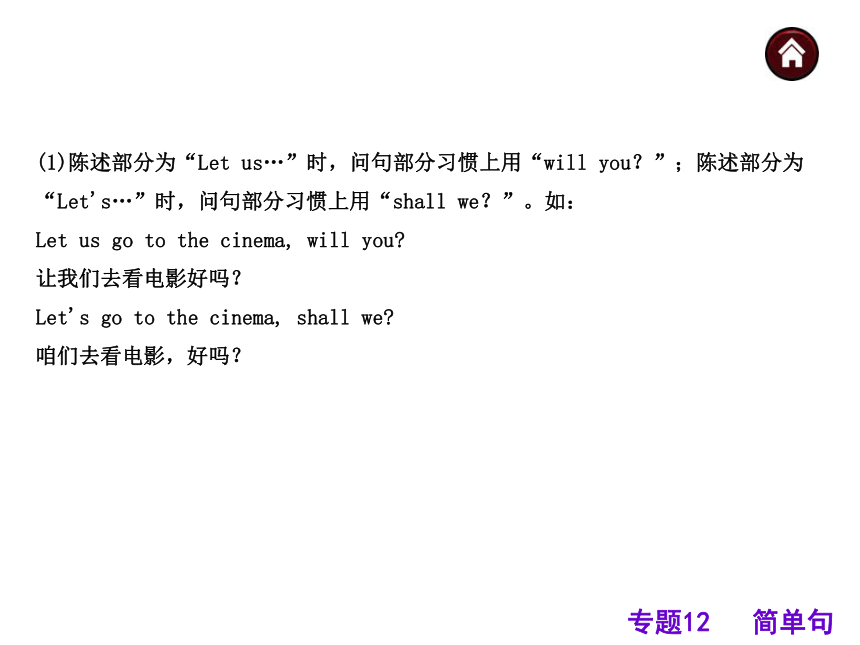

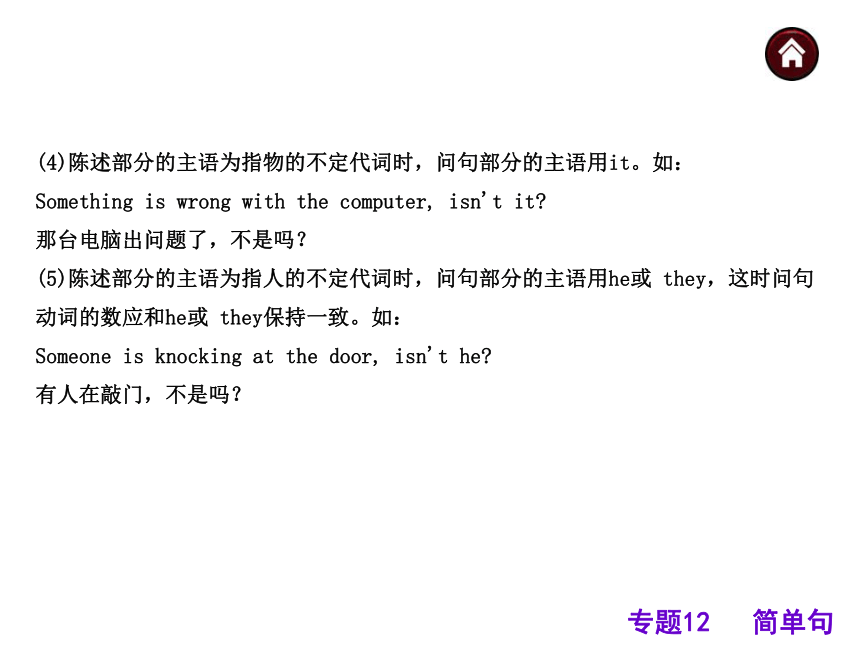

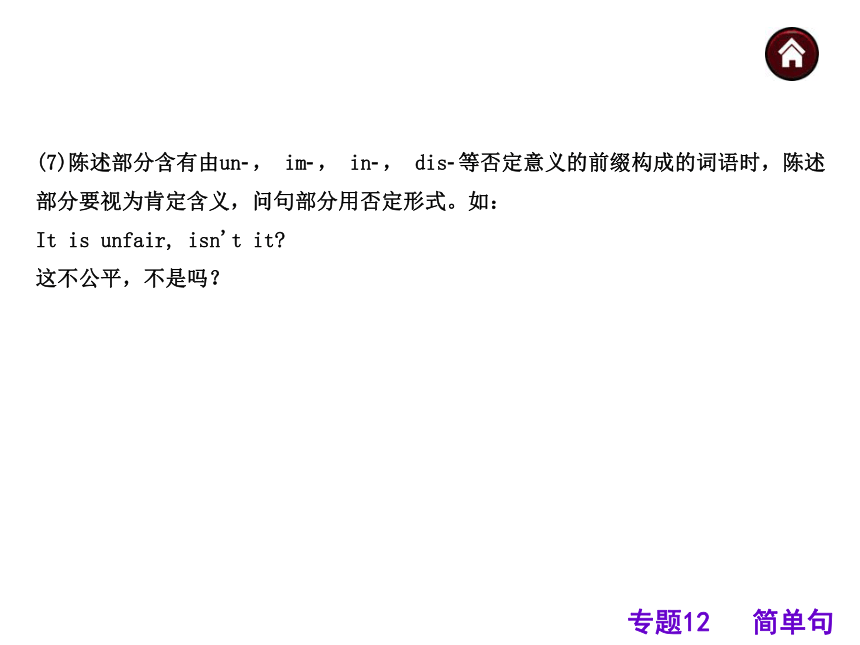

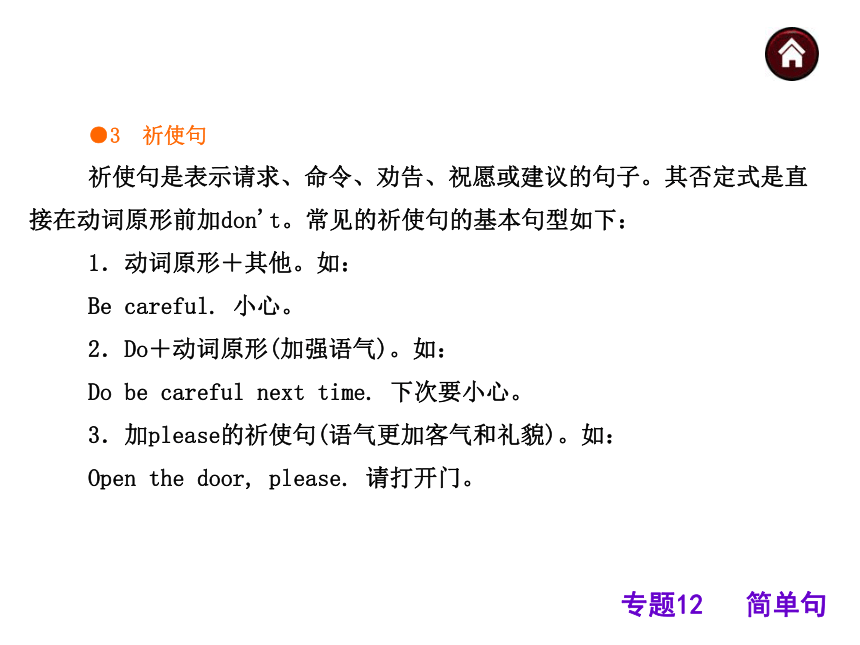
文档简介
课件58张PPT。专题12 简单句 专题12 简单句┃考点直击 ┃●1 陈述句
陈述句是用于陈述事实和观点的句子,包括肯定结构和否定结构。肯定句变否定句的基本方法如下:
1.be 动词的否定式: 在be动词后面加否定词not。如: We aren't classmates. 我们不是同班同学。
2.情态动词的否定式: 在情态动词后面直接加否定词not。如:
I can't speak English well. 我英语说得不好。
3.实义动词的否定式: 借助助动词do/does/did构成。一般现在时的句子的否定结构为“主语+doesn‘t/don’t+动词原形+其他”。如:He doesn't do exercise every day.
他不是每天都做锻炼。 专题12 简单句●2 疑问句
疑问句的主要交际功能是提出问题,询问情况。疑问句分为一般疑问句、选择疑问句、特殊疑问句和反意疑问句。
1.一般疑问句: 通常用来询问一件事情是否属实。答句通常是“Yes”或“No”。如:
—Are you tired? 你累吗?
—Yes, I am. 是的,我累。专题12 简单句2.选择疑问句: 提出两个或两个以上的可能答案供对方选择。如:
Shall we go home or stay here for the night?
我们回家还是待在这里过夜?
3.特殊疑问句: 以特殊疑问词开头,对句中某一成分提问的句子叫特殊疑问句。如:
What do you like most? 你最喜欢什么?专题12 简单句4.反意疑问句: 反意疑问句又叫附加疑问句,由两部分组成,前一部分是对事物的陈述(即陈述部分),后一部分是简短的提问(即问句部分),中间用逗号隔开。反意疑问句遵循“前否后肯”、“前肯后否”的原则,且两部分的人称和时态要保持一致。
中考中常见的反意疑问句的构成情况如下:专题12 简单句(1)陈述部分为“Let us…”时,问句部分习惯上用“will you?”;陈述部分为“Let's…”时,问句部分习惯上用“shall we?”。如:
Let us go to the cinema, will you?
让我们去看电影好吗?
Let's go to the cinema, shall we?
咱们去看电影,好吗?专题12 简单句(2)陈述部分为“There (Here)+ be +主语”时,问句部分用“be+not+there (here)?”形式。如:
There are two cakes on the plate, aren't there?
盘子里有两块蛋糕,不是吗?
(3)反意疑问句的陈述部分带有little, few, never, hardly, seldom等否定意义的词时,问句部分用肯定式。如:
She seldom goes swimming, does she?
她很少去游泳,是吗?专题12 简单句(4)陈述部分的主语为指物的不定代词时,问句部分的主语用it。如:
Something is wrong with the computer, isn't it?
那台电脑出问题了,不是吗?
(5)陈述部分的主语为指人的不定代词时,问句部分的主语用he或 they,这时问句动词的数应和he或 they保持一致。如:
Someone is knocking at the door, isn't he?
有人在敲门,不是吗?专题12 简单句(6)反意疑问句的陈述部分为“I (We) don't think (believe, suppose, consider等)+that从句”时,问句部分的动词和主语与that从句保持一致且用肯定式。如:
I don't think that he has finished the work on time, has he?
我认为他没有按时完成工作,不是吗?专题12 简单句(7)陈述部分含有由un-, im-, in-, dis-等否定意义的前缀构成的词语时,陈述部分要视为肯定含义,问句部分用否定形式。如:
It is unfair, isn't it?
这不公平,不是吗?专题12 简单句(8)陈述部分为肯定的祈使句时,问句部分可用“will you/won't you?”; 陈述部分为否定的祈使句时,问句部分只能用“will you?”。 如:
Don't make any noise, will you?
不要制造噪声,好吗?专题12 简单句●3 祈使句
祈使句是表示请求、命令、劝告、祝愿或建议的句子。其否定式是直接在动词原形前加don't。常见的祈使句的基本句型如下:
1.动词原形+其他。如:
Be careful. 小心。
2.Do+动词原形(加强语气)。如:
Do be careful next time. 下次要小心。
3.加please的祈使句(语气更加客气和礼貌)。如:
Open the door, please. 请打开门。专题12 简单句●4 感叹句
感叹句一般用来表示说话时的喜悦、惊讶等情感。英语感叹句常用what或how引导,句末用感叹号。
1.what引导的感叹句
(1)What+a/an+形容词+可数名词单数(+主语+谓语)!如:
What a difficult question it is!
多么难的一个问题啊!
(2)What+形容词+可数名词复数/不可数名词(+主语+谓语)!如:What useful information!多有用的信息啊!专题12 简单句2.how引导的感叹句
(1)How+形容词/副词+主语+谓语!如:
How kind they are!他们多和蔼啊!
(2)How+陈述句(主语+谓语)!如:
How time flies!时间飞逝!专题12 简单句3.what引导的感叹句可以和how引导的感叹句互换。如:
What a good girl!=How good the girl is!
多好的女孩啊!专题12 简单句●5 倒装句
1.副词位于句首时。here, there, now, then等副词置于句首时句子要倒装,谓语动词常用be, come, go, lie, run等。这种倒装结构的主语必须是名词,如果主语是人称代词时则不能完全倒装。如:
Here he comes. 他来了。专题12 简单句2.only在句首强调状语时。如:
Only then did he realize that he was wrong.
到那时他才意识到他错了。专题12 简单句3.以so/neither/nor开头的句子。说明前面的内容也适用于后者时用倒装句“so/neither/nor+be动词/助动词/情态动词+主语”。如:
John can't swim, neither can I.
约翰不会游泳,我也不会。专题12 简单句┃考点过关┃
● 基础过关
句型转换
1.Our school is beautiful.(改为感叹句)
________ ________ our school is!
2.Diana made great success in her research because she put her effort into it. (改为简单句)
Diana made great success in her research ________ ________ her effort.beautiful Howof because3.The children have never done that before.(改为反意疑问句)
The children have never done that before, _____ ______?
4.There are fifty students in our class. (对画线部分提问)
________ ________ students are there in your class?
5.Chen Ping received an email last Friday. (改为否定句)
Chen Ping________ ________ an email last Friday. 专题12 简单句they havemany Howreceivedidn't专题12 简单句( )1.[2014·青岛] —________ is it from your home to school?
—It‘s three miles.
A.How far B.How long
C.How big D.How high● 中考透视A考查疑问词辨析。句意:“从你家到学校多远?”“三英里。”how far意为“多远”,询问距离的远近;how long意为“多长”,询问时间或者物体的长短;how big意为“多大”,询问物体的体积大小;how high意为“多高”,询问高矮。由答语可知是对距离提问,故选A。专题12 简单句( )2.[2014·乌鲁木齐] —He's already come back to Australia, ________?
—Yes. We watched a movie together last night.
A.isn't he B.doesn't he
C.hasn't he D.has heC考查反意疑问句。问句中的's,是现在完成时态中has的缩写形式;根据反意疑问句“前肯后否”的原则可知选C。专题12 简单句( )3.[2014·黄石] —I'm leaving for Xisai Mountain this afternoon..
—________ you have packed everything.
A.To be sure B.Been sure
C.Being sure D.Be sureD考查祈使句。句意:“今天下午我要去西赛山。”“确保已经打包好所有东西了。”祈使句以动词原形开头,故选D。 专题12 简单句( )4.[2014·随州] —Your sister doesn't get up early, does she?
—________. But she gets up late on weekends.
A.No, she doesn't
B.Yes, she does
C.No, she does
D.Yes, she doesn'tB专题12 简单句( )5.[2014·咸宁] —________ sweet music!
—And I really like the Voice of China TV programmes.
A.What B.What a
C.How D.How aA考查感叹句的用法。句意:“多么优美的音乐啊!”“我是真的喜欢《中国好声音》这档电视节目。”本句的感叹中心词music是不可数名词,故用what引导感叹句。 专题12 简单句( )6.[2014·平凉] —Has your mother ever been to London?
—Yes, and ________.We went together.
A.so have I B.so I have
C.neither have I D.neither I haveA考查倒装句的用法。句意:“你母亲曾经去过伦敦吗?”“是的,我也去过。我们一起去的。”由“We went together”可知“我”也去了。故选A。┃语法专练┃
专题12 简单句( )1.I don't think she will pass the exam, ________?
A.won't she B.will she
C.does she D.doesn't sheB专题12 简单句( )2.—Mr Wang's never been to Canada, has he?
—________. He went there on business last week.
A.No, he hasn't B.Yes, he has
C.No, he has D.Yes, he hasn'tB专题12 简单句( )3.Don't make so much noise, ________?
A.do you B.don't you
C.will you D.won't youC专题12 简单句( )4.You've just finished your listening exam. Please get yourself ready for the next part, ________?
A.shall we B.will you
C.do you D.are youB专题12 简单句( )5.[2014·昆明] —Have you ever seen the TV show Where Are We Going, Dad?
—________. I think it's quite moving and funny.
A.Yes, I have B.No, I haven't
C.Yes, he has D.No, she hasn'tA本题考查情景交际。句意:“你看过节目《爸爸去哪儿》吗?”“看过。我认为它很感人,很有趣。”根据主语you可知用I回答;根据情景可知已经看过了,故选A。 专题12 简单句( )6.[2014·绵阳] —________ do you write an English article for our school newspaper?
—Sometimes.
A.How long B.How often
C.How much D.How farB考查疑问词组的词义辨析。句意:“你多久为我们的校报写一篇英文文章?”“有时。”how long意为“多久;多长”;how often意为“多久一次”;how much意为“多少;多少钱”;how far意为“多远”。sometimes是频度副词,对其提问应用how often。专题12 简单句( )7.—There is nothing else to do, ________?
—No, there isn't. We can have a rest.
A.is there B.isn't there
C.is it D.isn't itA专题12 简单句( )8.[2014·内江] He can hardly stay awake because he is so tired, ________?
A.does he B.isn't he
C.can't he D.can heD考查反意疑问句的用法。 反意疑问句的规则是“前肯后否”或者是“前否后肯”。题干中的hardly具有否定意义,所以选“前否后肯”,选 D。专题12 简单句( )9.There are more and more foreigners learning Chinese, ________?
A.are there B.aren't there
C.are they D.aren't theyB专题12 简单句( )10.[2014·梅州] ________ play with fire. ________ with fire is dangerous.
A.Don't; Playing
B.Not; Playing
C.Don't; Play
D.Not to; To playA考查否定祈使句和动名词作主语的用法。句意:不要玩火。玩火是危险的。前一句否定祈使句由“Don't+动词原形”构成;后一句中动词play放在句首充当句子主语,可以用动名词playing或不定式to play的形式,故选A。 专题12 简单句( )11.Nothing is more important than life,________?
A.is it B.isn't it
C.are they D.aren't theyA专题12 简单句( )12.—________ late for school again, Tom.
—Sorry, I promise that I ________.
A.Don't; won't B.Don't be; won't
C.Don't be; don't D.Don't; willB专题12 简单句( )13.________this kind of peach, and you will like it.
A. To try B.Trying
C.Try D.TriedC专题12 简单句( )14.________, because it's bad for your health.
A.Don't to eat too much
B.No eat too much
C.Never eat too much
D.Never eating too muchC专题12 简单句( )15.—________afraid of making mistakes.Failure is the mother of success.
—Thanks for encouraging me.
A.Don't B.Don't be
C.Not be D.Be notB专题12 简单句( )16.[2014·上海] The robot can help me sweep the floor. ________ smart invention it is!
A.What B.What a
C.What an D.HowB考查感叹句的用法。invention是可数名词单数,smart是以辅音音素开头的单词,因此,感叹句使用what a来引导。专题12 简单句( )17.[2014·南京] —________ brave Zhang Hua is!
—Yes. He helped his neighbour, Mrs Sun, out of the fire.
A.What a B.How
C.How a D.WhatB考查感叹句的用法。句意:张华多么勇敢啊!此处强调形容词brave,用how。专题12 简单句( )18.—________?
—The one on the stage.
A.Who are boys B.Where's the boy
C.Who's that boy D.Which boyD专题12 简单句( )19.—Have you watered the trees?
—________. I'm too busy and forget it.
A.Yes, I did B.Yes, I have
C.No, I didn't D.No, I haven'tD专题12 简单句( )20.________ wonderful news report hewrote! All of us were proud of him.
A.What a B.What
C.How D.How aA专题12 简单句( )21.[2014·黔东南] —________ will your parents come back?
—In a month.
A.How long B.When
C.How soon D.What timeC专题12 简单句( )22.[2014·济南] —________ does Linda want to be when she grows up?
—A tennis player like Li Na.
A.How B.When
C.What D.WhereC考查疑问词词义辨析。句意:“琳达长大后想当什么?”“一名像李娜一样的网球运动员。”根据答语可知,问句是对职业提问。故选C。专题12 简单句( )23.—Look! ________ dirty the water is!
—Yes, we should really take action to deal with it.
A.What a B.What
C.How D.How aC专题12 简单句( )24.—Two________died in the accident.
—________ terrible it is!
A.policemen; How
B.policeman; What
C.police; What
D.policemans; HowA专题12 简单句( )25.—Dad, do you like my picture?
—________! It's the nicest one I've ever seen!
A.What beautiful
B.How careful
C.How wonderful
D. What wonderful pictureC专题12 简单句( )26.—I have changed my job.
—________.
A.So do I B.So have I
C.So I do D.So I haveB专题12 简单句( )27.—Tom had got high marks in the last exam.
—________, and so did I.
A.So he had B.So had he
C.So he did D.So did heA用“so +主语+be动词/助动词/情态动词”表示同意对方的看法,意为“是的,的确”。专题12 简单句( )28.If you want to go to see the movie this evening, so ________ I.
A.do B.am C.will D.shouldC专题12 简单句( )29.Hey, Nick. ________ comes the last bus! Hurry up, or we'll have to walk home.
A.This B.There
C.That D.ItB考查以here/there开头的倒装句。 专题12 简单句( )30.John can't swim, ________ I.
A.so can B.nor can
C.neither can't D.so do B说明前面的否定内容也适用于后者时,用倒装结构“neither/nor+be动词/助动词/情态动词+主语”。 专题12 简单句( )31.—Would you like to go fishing?
—If Li Ping doesn't go, ________.
A.so do I B.neither I do
C.neither do I D.neither will ID专题12 简单句( )32.Only by taking more exercise________keep healthy.
A.can you B.you can
C.are you D.you areA
陈述句是用于陈述事实和观点的句子,包括肯定结构和否定结构。肯定句变否定句的基本方法如下:
1.be 动词的否定式: 在be动词后面加否定词not。如: We aren't classmates. 我们不是同班同学。
2.情态动词的否定式: 在情态动词后面直接加否定词not。如:
I can't speak English well. 我英语说得不好。
3.实义动词的否定式: 借助助动词do/does/did构成。一般现在时的句子的否定结构为“主语+doesn‘t/don’t+动词原形+其他”。如:He doesn't do exercise every day.
他不是每天都做锻炼。 专题12 简单句●2 疑问句
疑问句的主要交际功能是提出问题,询问情况。疑问句分为一般疑问句、选择疑问句、特殊疑问句和反意疑问句。
1.一般疑问句: 通常用来询问一件事情是否属实。答句通常是“Yes”或“No”。如:
—Are you tired? 你累吗?
—Yes, I am. 是的,我累。专题12 简单句2.选择疑问句: 提出两个或两个以上的可能答案供对方选择。如:
Shall we go home or stay here for the night?
我们回家还是待在这里过夜?
3.特殊疑问句: 以特殊疑问词开头,对句中某一成分提问的句子叫特殊疑问句。如:
What do you like most? 你最喜欢什么?专题12 简单句4.反意疑问句: 反意疑问句又叫附加疑问句,由两部分组成,前一部分是对事物的陈述(即陈述部分),后一部分是简短的提问(即问句部分),中间用逗号隔开。反意疑问句遵循“前否后肯”、“前肯后否”的原则,且两部分的人称和时态要保持一致。
中考中常见的反意疑问句的构成情况如下:专题12 简单句(1)陈述部分为“Let us…”时,问句部分习惯上用“will you?”;陈述部分为“Let's…”时,问句部分习惯上用“shall we?”。如:
Let us go to the cinema, will you?
让我们去看电影好吗?
Let's go to the cinema, shall we?
咱们去看电影,好吗?专题12 简单句(2)陈述部分为“There (Here)+ be +主语”时,问句部分用“be+not+there (here)?”形式。如:
There are two cakes on the plate, aren't there?
盘子里有两块蛋糕,不是吗?
(3)反意疑问句的陈述部分带有little, few, never, hardly, seldom等否定意义的词时,问句部分用肯定式。如:
She seldom goes swimming, does she?
她很少去游泳,是吗?专题12 简单句(4)陈述部分的主语为指物的不定代词时,问句部分的主语用it。如:
Something is wrong with the computer, isn't it?
那台电脑出问题了,不是吗?
(5)陈述部分的主语为指人的不定代词时,问句部分的主语用he或 they,这时问句动词的数应和he或 they保持一致。如:
Someone is knocking at the door, isn't he?
有人在敲门,不是吗?专题12 简单句(6)反意疑问句的陈述部分为“I (We) don't think (believe, suppose, consider等)+that从句”时,问句部分的动词和主语与that从句保持一致且用肯定式。如:
I don't think that he has finished the work on time, has he?
我认为他没有按时完成工作,不是吗?专题12 简单句(7)陈述部分含有由un-, im-, in-, dis-等否定意义的前缀构成的词语时,陈述部分要视为肯定含义,问句部分用否定形式。如:
It is unfair, isn't it?
这不公平,不是吗?专题12 简单句(8)陈述部分为肯定的祈使句时,问句部分可用“will you/won't you?”; 陈述部分为否定的祈使句时,问句部分只能用“will you?”。 如:
Don't make any noise, will you?
不要制造噪声,好吗?专题12 简单句●3 祈使句
祈使句是表示请求、命令、劝告、祝愿或建议的句子。其否定式是直接在动词原形前加don't。常见的祈使句的基本句型如下:
1.动词原形+其他。如:
Be careful. 小心。
2.Do+动词原形(加强语气)。如:
Do be careful next time. 下次要小心。
3.加please的祈使句(语气更加客气和礼貌)。如:
Open the door, please. 请打开门。专题12 简单句●4 感叹句
感叹句一般用来表示说话时的喜悦、惊讶等情感。英语感叹句常用what或how引导,句末用感叹号。
1.what引导的感叹句
(1)What+a/an+形容词+可数名词单数(+主语+谓语)!如:
What a difficult question it is!
多么难的一个问题啊!
(2)What+形容词+可数名词复数/不可数名词(+主语+谓语)!如:What useful information!多有用的信息啊!专题12 简单句2.how引导的感叹句
(1)How+形容词/副词+主语+谓语!如:
How kind they are!他们多和蔼啊!
(2)How+陈述句(主语+谓语)!如:
How time flies!时间飞逝!专题12 简单句3.what引导的感叹句可以和how引导的感叹句互换。如:
What a good girl!=How good the girl is!
多好的女孩啊!专题12 简单句●5 倒装句
1.副词位于句首时。here, there, now, then等副词置于句首时句子要倒装,谓语动词常用be, come, go, lie, run等。这种倒装结构的主语必须是名词,如果主语是人称代词时则不能完全倒装。如:
Here he comes. 他来了。专题12 简单句2.only在句首强调状语时。如:
Only then did he realize that he was wrong.
到那时他才意识到他错了。专题12 简单句3.以so/neither/nor开头的句子。说明前面的内容也适用于后者时用倒装句“so/neither/nor+be动词/助动词/情态动词+主语”。如:
John can't swim, neither can I.
约翰不会游泳,我也不会。专题12 简单句┃考点过关┃
● 基础过关
句型转换
1.Our school is beautiful.(改为感叹句)
________ ________ our school is!
2.Diana made great success in her research because she put her effort into it. (改为简单句)
Diana made great success in her research ________ ________ her effort.beautiful Howof because3.The children have never done that before.(改为反意疑问句)
The children have never done that before, _____ ______?
4.There are fifty students in our class. (对画线部分提问)
________ ________ students are there in your class?
5.Chen Ping received an email last Friday. (改为否定句)
Chen Ping________ ________ an email last Friday. 专题12 简单句they havemany Howreceivedidn't专题12 简单句( )1.[2014·青岛] —________ is it from your home to school?
—It‘s three miles.
A.How far B.How long
C.How big D.How high● 中考透视A考查疑问词辨析。句意:“从你家到学校多远?”“三英里。”how far意为“多远”,询问距离的远近;how long意为“多长”,询问时间或者物体的长短;how big意为“多大”,询问物体的体积大小;how high意为“多高”,询问高矮。由答语可知是对距离提问,故选A。专题12 简单句( )2.[2014·乌鲁木齐] —He's already come back to Australia, ________?
—Yes. We watched a movie together last night.
A.isn't he B.doesn't he
C.hasn't he D.has heC考查反意疑问句。问句中的's,是现在完成时态中has的缩写形式;根据反意疑问句“前肯后否”的原则可知选C。专题12 简单句( )3.[2014·黄石] —I'm leaving for Xisai Mountain this afternoon..
—________ you have packed everything.
A.To be sure B.Been sure
C.Being sure D.Be sureD考查祈使句。句意:“今天下午我要去西赛山。”“确保已经打包好所有东西了。”祈使句以动词原形开头,故选D。 专题12 简单句( )4.[2014·随州] —Your sister doesn't get up early, does she?
—________. But she gets up late on weekends.
A.No, she doesn't
B.Yes, she does
C.No, she does
D.Yes, she doesn'tB专题12 简单句( )5.[2014·咸宁] —________ sweet music!
—And I really like the Voice of China TV programmes.
A.What B.What a
C.How D.How aA考查感叹句的用法。句意:“多么优美的音乐啊!”“我是真的喜欢《中国好声音》这档电视节目。”本句的感叹中心词music是不可数名词,故用what引导感叹句。 专题12 简单句( )6.[2014·平凉] —Has your mother ever been to London?
—Yes, and ________.We went together.
A.so have I B.so I have
C.neither have I D.neither I haveA考查倒装句的用法。句意:“你母亲曾经去过伦敦吗?”“是的,我也去过。我们一起去的。”由“We went together”可知“我”也去了。故选A。┃语法专练┃
专题12 简单句( )1.I don't think she will pass the exam, ________?
A.won't she B.will she
C.does she D.doesn't sheB专题12 简单句( )2.—Mr Wang's never been to Canada, has he?
—________. He went there on business last week.
A.No, he hasn't B.Yes, he has
C.No, he has D.Yes, he hasn'tB专题12 简单句( )3.Don't make so much noise, ________?
A.do you B.don't you
C.will you D.won't youC专题12 简单句( )4.You've just finished your listening exam. Please get yourself ready for the next part, ________?
A.shall we B.will you
C.do you D.are youB专题12 简单句( )5.[2014·昆明] —Have you ever seen the TV show Where Are We Going, Dad?
—________. I think it's quite moving and funny.
A.Yes, I have B.No, I haven't
C.Yes, he has D.No, she hasn'tA本题考查情景交际。句意:“你看过节目《爸爸去哪儿》吗?”“看过。我认为它很感人,很有趣。”根据主语you可知用I回答;根据情景可知已经看过了,故选A。 专题12 简单句( )6.[2014·绵阳] —________ do you write an English article for our school newspaper?
—Sometimes.
A.How long B.How often
C.How much D.How farB考查疑问词组的词义辨析。句意:“你多久为我们的校报写一篇英文文章?”“有时。”how long意为“多久;多长”;how often意为“多久一次”;how much意为“多少;多少钱”;how far意为“多远”。sometimes是频度副词,对其提问应用how often。专题12 简单句( )7.—There is nothing else to do, ________?
—No, there isn't. We can have a rest.
A.is there B.isn't there
C.is it D.isn't itA专题12 简单句( )8.[2014·内江] He can hardly stay awake because he is so tired, ________?
A.does he B.isn't he
C.can't he D.can heD考查反意疑问句的用法。 反意疑问句的规则是“前肯后否”或者是“前否后肯”。题干中的hardly具有否定意义,所以选“前否后肯”,选 D。专题12 简单句( )9.There are more and more foreigners learning Chinese, ________?
A.are there B.aren't there
C.are they D.aren't theyB专题12 简单句( )10.[2014·梅州] ________ play with fire. ________ with fire is dangerous.
A.Don't; Playing
B.Not; Playing
C.Don't; Play
D.Not to; To playA考查否定祈使句和动名词作主语的用法。句意:不要玩火。玩火是危险的。前一句否定祈使句由“Don't+动词原形”构成;后一句中动词play放在句首充当句子主语,可以用动名词playing或不定式to play的形式,故选A。 专题12 简单句( )11.Nothing is more important than life,________?
A.is it B.isn't it
C.are they D.aren't theyA专题12 简单句( )12.—________ late for school again, Tom.
—Sorry, I promise that I ________.
A.Don't; won't B.Don't be; won't
C.Don't be; don't D.Don't; willB专题12 简单句( )13.________this kind of peach, and you will like it.
A. To try B.Trying
C.Try D.TriedC专题12 简单句( )14.________, because it's bad for your health.
A.Don't to eat too much
B.No eat too much
C.Never eat too much
D.Never eating too muchC专题12 简单句( )15.—________afraid of making mistakes.Failure is the mother of success.
—Thanks for encouraging me.
A.Don't B.Don't be
C.Not be D.Be notB专题12 简单句( )16.[2014·上海] The robot can help me sweep the floor. ________ smart invention it is!
A.What B.What a
C.What an D.HowB考查感叹句的用法。invention是可数名词单数,smart是以辅音音素开头的单词,因此,感叹句使用what a来引导。专题12 简单句( )17.[2014·南京] —________ brave Zhang Hua is!
—Yes. He helped his neighbour, Mrs Sun, out of the fire.
A.What a B.How
C.How a D.WhatB考查感叹句的用法。句意:张华多么勇敢啊!此处强调形容词brave,用how。专题12 简单句( )18.—________?
—The one on the stage.
A.Who are boys B.Where's the boy
C.Who's that boy D.Which boyD专题12 简单句( )19.—Have you watered the trees?
—________. I'm too busy and forget it.
A.Yes, I did B.Yes, I have
C.No, I didn't D.No, I haven'tD专题12 简单句( )20.________ wonderful news report hewrote! All of us were proud of him.
A.What a B.What
C.How D.How aA专题12 简单句( )21.[2014·黔东南] —________ will your parents come back?
—In a month.
A.How long B.When
C.How soon D.What timeC专题12 简单句( )22.[2014·济南] —________ does Linda want to be when she grows up?
—A tennis player like Li Na.
A.How B.When
C.What D.WhereC考查疑问词词义辨析。句意:“琳达长大后想当什么?”“一名像李娜一样的网球运动员。”根据答语可知,问句是对职业提问。故选C。专题12 简单句( )23.—Look! ________ dirty the water is!
—Yes, we should really take action to deal with it.
A.What a B.What
C.How D.How aC专题12 简单句( )24.—Two________died in the accident.
—________ terrible it is!
A.policemen; How
B.policeman; What
C.police; What
D.policemans; HowA专题12 简单句( )25.—Dad, do you like my picture?
—________! It's the nicest one I've ever seen!
A.What beautiful
B.How careful
C.How wonderful
D. What wonderful pictureC专题12 简单句( )26.—I have changed my job.
—________.
A.So do I B.So have I
C.So I do D.So I haveB专题12 简单句( )27.—Tom had got high marks in the last exam.
—________, and so did I.
A.So he had B.So had he
C.So he did D.So did heA用“so +主语+be动词/助动词/情态动词”表示同意对方的看法,意为“是的,的确”。专题12 简单句( )28.If you want to go to see the movie this evening, so ________ I.
A.do B.am C.will D.shouldC专题12 简单句( )29.Hey, Nick. ________ comes the last bus! Hurry up, or we'll have to walk home.
A.This B.There
C.That D.ItB考查以here/there开头的倒装句。 专题12 简单句( )30.John can't swim, ________ I.
A.so can B.nor can
C.neither can't D.so do B说明前面的否定内容也适用于后者时,用倒装结构“neither/nor+be动词/助动词/情态动词+主语”。 专题12 简单句( )31.—Would you like to go fishing?
—If Li Ping doesn't go, ________.
A.so do I B.neither I do
C.neither do I D.neither will ID专题12 简单句( )32.Only by taking more exercise________keep healthy.
A.can you B.you can
C.are you D.you areA
同课章节目录
- 词法
- 名词
- 动词和动词短语
- 动词语态
- 动词时态
- 助动词和情态动词
- 非谓语动词
- 冠词
- 代词
- 数词和量词
- 形容词副词及其比较等级
- 介词和介词短语
- 连词和感叹词
- 构词法
- 相似、相近词比较
- 句法
- 陈述句
- 一般疑问句和否定疑问句
- 特殊疑问句及选择疑问句
- 反意疑问句
- 存在句(There be句型)
- 宾语从句
- 定语从句
- 状语从句
- 主谓一致问题
- 简单句
- 并列句
- 复合句
- 主谓一致
- 主、表语从句
- 名词性从句
- 直接引语和间接引语
- 虚拟语气
- 感叹句
- 强调句
- 倒装句
- 祈使句
- 句子的成分
- 句子的分类
- 题型专区
- 单项选择部分
- 易错题
- 完形填空
- 阅读理解
- 词汇练习
- 听说训练
- 句型转换
- 补全对话
- 短文改错
- 翻译
- 书面表达
- 任务型阅读
- 语法填空
- 其他资料
